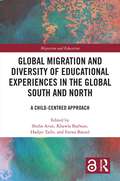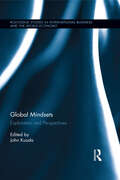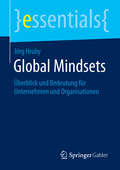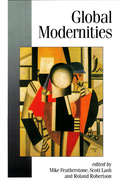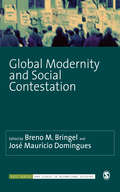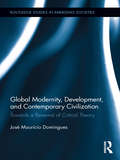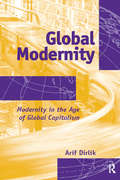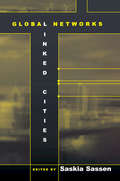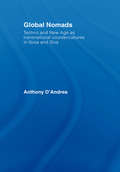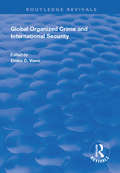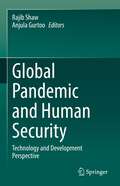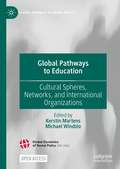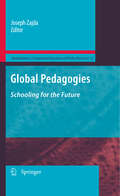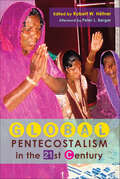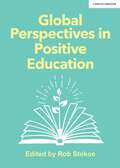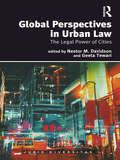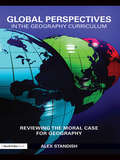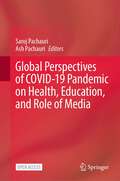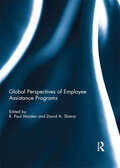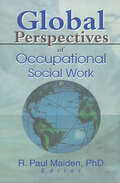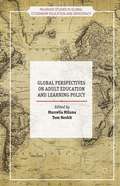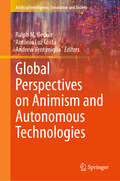- Table View
- List View
Global Migration and Diversity of Educational Experiences in the Global South and North: A Child-Centred Approach (Migration and Education)
by Shoba Arun Khawla Badwan Hadjer Taibi Farwa BatoolThis book presents a child-centred approach to migrant children’s experiences in education. Using a decolonising framework, the book interrogates the diversity of migrant experiences in the global South and North. The book brings together researchers and practitioners from education, childhood studies, sociology, and linguistics to debate and theorise key methodological and empirical issues in migrant children’s experiences through education. It focuses on how diverse forms of global mobilities are key to transforming educational experiences of children and considers the interplay of class, race, gender, geography, and learning settings. By doing so, the book uncovers particular challenges for addressing sustainable development goals relating to education and inclusive development. Diversifying the study of migration and development, the book challenges the Eurocentrism of the discipline and contributes to ongoing efforts to liberate the field from labels and discourses that further marginalise migrant children. Using an intersectional and decolonising approach to address an important gap in the diversity of migrant experiences, the book will be of great interest to researchers, scholars, and students in the field of migration studies, sociology of education, intercultural education, and international development.
Global Migration, Gender, and Health Professional Credentials: Transnational Value Transfers and Losses
by Margaret Walton-RobertsBringing together diverse approaches and case studies of international health worker migration, Global Migration, Gender, and Health Professional Credentials critically reimagines how we conceptualize the transfer of value embodied in internationally educated health professionals (IEHPs). This volume provides key insights into the economistic and feminist concepts of global value transmission, the complexity of health worker migration, and the gendered and intersectional intricacies involved in the workplace integration of immigrant health care workers. The contributions to this edited collection uncover the multitude of actors who play a role in creating, transmitting, transforming, and utilizing the value embedded in international health migrants.
Global Mindsets: Exploration and Perspectives (Routledge Studies in International Business and the World Economy #64)
by John KuadaGlobal Mindsets seeks to tackle a topic that is relatively new in research and practice, and is considered by many to be critical for firms seeking to conduct global business. It argues that multiple mindsets exist (across and within organizations), that they operate in a global context, and that they are dynamic and undergo change and action. Part of the mindset(s) may depend upon place, situation and context where individuals and organizations operate. The book examines the notion of "mindset" is situational and dynamic, especially in a global setting, why it is important for future scholars and managers and how it could be conceptualized. The book includes conceptual chapters that push the current boundaries of research on the topic and empirical chapters that demonstrate how different organizations in different countries apply mindset perspectives in their management practices. It seeks to help academics, consultants, and researchers understand what has been said and studied about global mindsets in action and gain insights into possible directions and challenges that the field may face in the future.
Global Mindsets: Überblick und Bedeutung für Unternehmen und Organisationen (essentials)
by Jörg HrubyIm internationalen Konkurrenzkampf am Markt ist die Entwicklung eines Global Mindset ein wichtiger Erfolgsfaktor für Unternehmen. Ein Global Mindset wird als die kognitive Fähigkeit definiert, unterschiedliche Kulturen zu verstehen und diese miteinander zu verbinden. In diesem Kontext besteht die Rolle von Führungskräften darin, mit Komplexität, Vielfältigkeit, Unsicherheit und Ambiguität umzugehen, das Zusammenarbeiten von Menschen aus unterschiedlichen Ländern und Kulturen zu ermöglichen, Mitarbeiter und Prozesse an verschiedenen Orten zu koordinieren sowie das Arbeiten über nationale, organisationale und funktionale Grenzen hinweg zu gestalten. Studien belegen, dass ein Global Mindset den unternehmerischen Erfolg und die Internationalisierung positiv beeinflusst. Ergänzend werden Möglichkeiten der Messung bzw. Diagnose eines Global Mindset im Unternehmen vorgeschlagen.
Global Modernities: Nationalism, Globalization And Modernity (Published in association with Theory, Culture & Society #36)
by Mike Featherstone Roland Robertson Scott M. LashGlobal Modernities is a sustained commentary on the international character of the most microcosmic practices. It demonstrates how the global increasingly informs the regional, so deconstructing ideas like the `nation state' and `national sovereignty'. The spatialization of social theory, hybridization and bio-politics are among the critical issues discussed.
Global Modernity and Social Contestation (SAGE Studies in International Sociology)
by Dr Breno M. Bringel Jose Mauricio Domingues"A new generation of truly global sociology, grappling with the contemporary world through the lenses of critique, contestation, and social movements. A significant contribution." - Göran Therborn, University of Cambridge "This is a truly global and politically challenging book, bringing together top level researchers and sharply tackling its themes. People from every corner of the planet and from all walks in the social sciences will surely profit from reading it." - Carolina Mera, University of Buenos Aires How can we link contemporary social processes – which have typically been theorized in terms of the concept of modernity – with contemporary social movements, conflicts, and mobilizations which aim at social change? This text: links the social theory of modernity to critical theory and to recent class and citizenship politics as well as to identity politics uses concrete social processes to illustrate theoretical discussion with relevant empirical studies and applies theoretical analysis to different interactions, tensions and possibilities to provide an integrated understanding of global modernity and social contestation includes contributions from distinguished international scholars working in sociological theory and modernity, as well as social movement studies and political contestation, with a strong emphasis on global issues This is a key resource for research in both social theory and the sociology of modernity, as well as social movements and social contestation, and readers interested in globalization and global studies.
Global Modernity and Social Contestation (SAGE Studies in International Sociology)
by Dr Breno M. Bringel Jose Mauricio Domingues"A new generation of truly global sociology, grappling with the contemporary world through the lenses of critique, contestation, and social movements. A significant contribution." - Göran Therborn, University of Cambridge "This is a truly global and politically challenging book, bringing together top level researchers and sharply tackling its themes. People from every corner of the planet and from all walks in the social sciences will surely profit from reading it." - Carolina Mera, University of Buenos Aires How can we link contemporary social processes - which have typically been theorized in terms of the concept of modernity - with contemporary social movements, conflicts, and mobilizations which aim at social change? This text: links the social theory of modernity to critical theory and to recent class and citizenship politics as well as to identity politics uses concrete social processes to illustrate theoretical discussion with relevant empirical studies and applies theoretical analysis to different interactions, tensions and possibilities to provide an integrated understanding of global modernity and social contestation includes contributions from distinguished international scholars working in sociological theory and modernity, as well as social movement studies and political contestation, with a strong emphasis on global issues This is a key resource for research in both social theory and the sociology of modernity, as well as social movements and social contestation, and readers interested in globalization and global studies.
Global Modernity, Development, and Contemporary Civilization: Towards a Renewal of Critical Theory (Routledge Studies in Emerging Societies)
by José Maurício DominguesThis book investigates modern global civilization, offering an alternative to post-colonial theories and the "multiple modernities" approach (as well as the civilizational theory linked to it). It argues that modernity has become a global civilization that is heterogeneous and intertwined with other civilizations, and also aims at a renewal of critical theory that is not US-centric and Eurocentric, focusing instead on China, South Asia (India) and Latin America (Brazil). Dealing with the themes of centre-periphery relations, complexity (including culture and religion), democracy and emancipatory possibilities, this book is based on general theoretical ideas such as collective subjectivity, the interplay of memory and creativity, and the concept of "modernizing moves," so as to deal with historical contingency.
Global Modernity: Modernity in the Age of Global Capitalism
by Arif Dirlik"A compelling essay on the contemporary human condition." William D. Coleman, Director of the Institute on Globalization and the Human Condition, McMaster University "An unusually perceptive and balanced appraisal of the globalization hype and its relation to the reality of global capitalism." Immanuel Wallerstein, Yale University In his provocative new book Arif Dirlik argues that the present represents not the beginning of globalization, but its end. We are instead in a new era in the unfolding of capitalism -- "global modernity". The fall of communism in the 1980s generated culturally informed counter-claims to modernity. Globalization has fragmented our understanding of what is "modern". Dirlik's "global modernity" is a concept that enables us to distinguish the present from its Eurocentric past, while recognizing the crucial importance of that past in shaping the present.
Global Networks, Linked Cities
by Saskia SassenIn her pioneering book The Global City, Saskia Sassen argued that certain cities in the postindustrial world have become central nodes in the new service economy, strategic sites for the acceleration of capital and information flows as well as spaces of increasing socio-economic polarization. One effect has been that such cities have gained in importance and power relative to nation-states. In this new collection of essays, Sassen and a distinguished group of contributors expand on the author's earlier work in a number of important ways, focusing on two key issues. First, they look at how information flows have bound global cities together in networks, creating a global city web whose constituent cities become global through the networks they participate in. Second, they investigate emerging global cities in the developing world-Sao Paulo, Shanghai, Hong Kong, Mexico City, Beirut, the Dubai-Iran corridor, and Buenos Aires. They show how these globalizing zones are not only replicating many features of the top tier of global cities, but are also generating new socio-economic patterns as well. These new patterns of development promise to lead to significant changes in the structure of the global economy, as more and more cities worldwide are integrated into globalization's circuitry. Includes contributions from:Linda Garcia, Patrice Riemens, Geert Lovink, Peter Taylor, David Smith, Michael Timberlake, Stephen Graham, Sueli Schiffer Ramos, Christoff Parnreiter, Felicity Gu, David Meyer, Pablo Ciccolella, Iliana Mignaqui, Eric Huybrechts, Ali Parsa. Also includes six maps.
Global Nomads: Techno and New Age as Transnational Countercultures in Ibiza and Goa (International Library of Sociology)
by Anthony D'AndreaGlobal Nomads provides a unique introduction to the globalization of countercultures, a topic largely unknown in and outside academia. Anthony D’Andrea examines the social life of mobile expatriates who live within a global circuit of countercultural practice in paradoxical paradises. Based on nomadic fieldwork across Spain and India, the study analyzes how and why these post-metropolitan subjects reject the homeland in order to shape an alternative lifestyle. They become artists, therapists, exotic traders and bohemian workers seeking to integrate labor, mobility and spirituality within a cosmopolitan culture of expressive individualism. These countercultural formations, however, unfold under neo-liberal regimes that appropriate utopian spaces, practices and imaginaries as commodities for tourism, entertainment and media consumption. In order to understand the paradoxical globalization of countercultures, Global Nomads develops a dialogue between global and critical studies by introducing the concept of 'neo-nomadism' which seeks to overcome some of the shortcomings in studies of globalization. This book is an essential aide for undergraduate, postgraduate and research students of Sociology, Anthropology of Globalization, Cultural Studies and Tourism Studies.
Global Organized Crime and International Security (Routledge Revivals)
by Emilio C. VianoPublished in 1999, this book focuses on organized crime as a worldwide phenomenon that has taken great advantage of enabling technology in banking, communications and transportation to build what is probably the first true 'virtual' corporation in the world. It looks at organized crime as a threat to national and international security ironically stemming, in part, from the collapse of the Soviet empire that provided an already thriving, ruthless and well-organized system of graft, corruption and crime with a new lease of life and also unleashed it on to the world scene. Organized crime is also seen as a system of transnational alliances with the potential to destabilize democratic values and institutions; distort regional, if not worldwide, economies; and subvert the international order by allying itself with terrorist organizations, rogue states and developing countries in search of rapid industrialization and market dominance.
Global Pandemic and Human Security: Technology and Development Perspective
by Rajib Shaw Anjula GurtooThis book highlights how the human security aspect has been affected by the global pandemic, based on the specific case study, field data, and evidence. COVID-19 has exemplified that the pandemic is global, but its responses are local. The responses depend on national governance and policy framework, use of technology and innovation, and people’s perceptions and behavior, among many others. There are many differences in how the pandemic has affected the rich and the poor, urban and rural sectors, development and fiscal sectors, and developed and developing nations and communities.Echoing human security principles, the 2030 Agenda emphasized a “world free of poverty, hunger, disease and want… free of fear and violence… with equitable and universal access to quality education, health care, and social protection….to safe drinking water and sanitation… where food is sufficient, safe, affordable and nutritious… where habitats are safe, resilient and sustainable…and where there is universal access to affordable, reliable and sustainable energy.” These basic human security [PA1] principles and development agenda are highly affected by the global pandemic worldwide, irrespective of its development and economic status. Thus, the book highlights the nexus between human security and development issues. It has two major pillars, one is the development and the other is technology issues. These two inter-dependent topics are discussed in the perspective of the global pandemic, making this the most important feature of this book.While the world is still in the middle of a pandemic, and possibly other natural and biological hazards may affect peoples’ lives and livelihoods in the future, this book provides some key learning, which can be used to cope with future uncertainties, including climate risks. Thus, the book is timely and relevant to wider readers.
Global Pathways to Education: Cultural Spheres, Networks, and International Organizations (Global Dynamics of Social Policy)
by Kerstin Martens Michael WindzioIn this open access volume, the editors identify the trajectories and patterns displayed by education systems and investigate the causes of change from a global and historical perspective. The contributors argue that the emergence and development of education systems can be traced back to inherent national factors, as well as to the international diffusion of ideas.The research presented in this volume is a wide-ranging analysis and explanation of the dynamics of emergence, diffusion, and change in relation to state education systems. The chapters offer an empirical investigation into whether the global diffusion of Western-rational educational content and organizational forms occurs as expected by neoinstitutionalist theory, or whether culturally specific developmental paths dominate in different parts of the world.The book will be of interest to students and researchers in various social science disciplines, including social policy, education, sociology, political science, international relations, organizational theory, and economics.
Global Pedagogies
by Joseph ZajdaGlobal Pedagogies: Schooling for the Future, which is the twelfth volume in the 12-volume book series Globalisation, Comparative Education and Policy Research, presents scholarly research on major discourses in comparative education research with reference to globalisation, educational policy and classroom pedagogy. It is a sourcebook of ideas for researchers, practitioners and policy makers in education, globalisation, global pedagogies and schooling for the future around the world. The aim of the book is to provide an easily accessible, practical yet scholarly source of information about the international concern in the field of globalisation, global pedagogies, and educational transformation. Readers will find here the very latest thinking on globalisation, global pedagogies and educational transformation in the context of global culture. It offers a timely overview of current issues affecting discourses pertaining to global pedagogies and policy research in the global culture. It provides directions in education, and policy research, relevant to transformational educational reforms in the 21st century. The book critically examines the overall interplay between comparative education discourses, globalisation, and education. It draws upon recent studies in the areas of globalisation, equity, social justice, and the role of the State. It explores conceptual frameworks and methodological approaches applicable in the research covering the State, globalisation, equity, and education. It demonstrates the neo-liberal ideological imperatives of education and policy reforms, and illustrates the way the relationship between the State and education policy affects current models and trends in education reforms and schooling globally. Various book chapters critique the dominant discourses and debates pertaining to comparative education discourses and the newly constructed and re-invented models of neo-liberal ideology in education. Using a number of diverse paradigms in comparative education research, ranging from critical theory to globalisation, the authors, by focusing on globalisation, ideology and democracy, attempt to examine critically both the reasons and outcomes of education reforms, policy change and transformation and provide a more informed critique on the Western-driven models of accountability, quality and school effectiveness. The book draws upon recent studies in the areas of equity, cultural capital and dominant ideologies in education.
Global Pentecostalism in the 21st Century
by Peter L. BergerThis state-of-the-field overview of Pentecostalism around the world focuses on cultural developments among second- and third-generation adherents in regions with large Pentecostal communities, considering the impact of these developments on political participation, citizenship, gender relations, and economic morality. Leading scholars from anthropology, sociology, religious studies, and history present useful introductions to global issues and country-specific studies drawn from Latin America, Africa, Asia, and the former USSR.
Global Perspectives in Positive Education
by Rob StokoeThe common goal of the contributing authors in this publication is to engage, learn from and share success in order to energise the positive education movement for the benefit of our young people. This is the greatest contribution we can make to the future of our global society and the wellbeing of its citizens. We all seek to offer to everyone the potential to achieve success, to be purposeful and content, contributing positively to their own wellbeing and that of others. Presenting at conferences across Australia, Singapore, Dubai and the UK has offered a unique insight in to the breadth and quality of Positive Education globally. The positive education community encompasses a dedicated and selfless group of individuals researchers, practitioners and leaders who are doing great things to help more young people to grow as robust individuals and learners. Yet all too often we fail to join the dots, to connect the passion and expertise of our global community, to share the best of what we do and what we think.Sharing are expertise, passion and enthusiasm is essential if we are to truly support our young people. The International Positive Education Network (IPEN) was established in 204 to promote these values and sharing of insight and expertise. Its mission being to promote academics alongside character and wellbeing, to connect people and to share best practice worldwide.The commitment to these values are exemplified by the writers who have kindly offered their expertise for the good of others, from Dr Helen Street, Australia, to Yukun Zhao in China and Professor Leonid Illushin in Russia. Other chapters have come from Dr. Abdullah Al Karam, KHDA, Dubai, Professor Andrew Martin, Australia and Amba Brown in Singapore.
Global Perspectives in Positive Education
by Rob StokoeThe common goal of the contributing authors in this publication is to engage, learn from and share success in order to energise the positive education movement for the benefit of our young people. This is the greatest contribution we can make to the future of our global society and the wellbeing of its citizens. We all seek to offer to everyone the potential to achieve success, to be purposeful and content, contributing positively to their own wellbeing and that of others. Presenting at conferences across Australia, Singapore, Dubai and the UK has offered a unique insight in to the breadth and quality of Positive Education globally. The positive education community encompasses a dedicated and selfless group of individuals researchers, practitioners and leaders who are doing great things to help more young people to grow as robust individuals and learners. Yet all too often we fail to join the dots, to connect the passion and expertise of our global community, to share the best of what we do and what we think.Sharing are expertise, passion and enthusiasm is essential if we are to truly support our young people. The International Positive Education Network (IPEN) was established in 204 to promote these values and sharing of insight and expertise. Its mission being to promote academics alongside character and wellbeing, to connect people and to share best practice worldwide.The commitment to these values are exemplified by the writers who have kindly offered their expertise for the good of others, from Dr Helen Street, Australia, to Yukun Zhao in China and Professor Leonid Illushin in Russia. Other chapters have come from Dr. Abdullah Al Karam, KHDA, Dubai, Professor Andrew Martin, Australia and Amba Brown in Singapore.
Global Perspectives in Urban Law: The Legal Power of Cities (Juris Diversitas)
by Nestor M. Davidson Geeta TewariThe growing field of urban law demands a collaborative scholarly focus on comparative and global perspectives. This volume offers diverse insights into urban law, with emerging theories and analyses of topics ranging from criminal reform and urban housing, to social and economic inequality and financial crises, and democratization and freedom for individual identity and space. Particularly now, social, economic, and cultural issues must be closely examined in conjunction with the rule of law not only to address inadequate access to basic services, but also to construct long-term plans for our cities and our world—a bright, safe future.
Global Perspectives in the Geography Curriculum: Reviewing the Moral Case for Geography
by Alex Standish‘For geographers across the globe this book provides the arguments for a return to the teaching of geography and why they should reject the politicisation of the subject by education policy makers and politicians. Standish’s careful critique shows the necessity of a depoliticised geography curriculum the irony of which would be that it would ensure that every child could point to Iraq, Iran and Afghanistan on a map.’ Prof. Dennis Hayes – Oxford Brookes University, UK 'A prescient and critical analysis of the changing face of geographyteaching. This book deserves to be widely read and debated. Alex Standish's book puts current trends in geography teaching in historical and critical context. It comprises a forthright and timely defence of geographical education for its own sake.' Dr Jim Butcher, FRSA, Department of Sport Science, Tourism and Leisure, Canterbury Christ Church University. Since the early 1990s, educational policy makers and some subject leaders have been seeking to fundamentally change the teaching of geography in UK and US schools, from a subject which encourages students to explore spatial concepts, ideas and skills, to a more ethics based subject concerned with the promotion of environmentalism, cultural diversity and social justice. In this book the new approach is critically examined, within a historical and ideological context, addressing a number of fundamental questions: Should geography be used as a tool for the delivery of citizenship ideals? How does this affect the intellectual and moral value of geographical education for young people? If the state and teachers are taking more responsibility for the values, attitudes and emotional responses of students, how will they learn to develop these qualities for themselves? If global perspectives shift the focus of education from learning about the outside world to learning about the self, what is its vision of social progress and conception of social change? This book advocates a return to liberal models of education, arguing that the new approach to geography currently being promoted for schools fundamentally undermines the educational value of the subject, and the freedom of young people to shape the world in which they live. A vital resource for teachers and student teachers alike, Global Perspectives in the Geography Curriculum makes a significant contribution to the growing debate about the future direction of the discipline itself.
Global Perspectives of COVID-19 Pandemic on Health, Education, and Role of Media
by Saroj Pachauri Ash PachauriThis open access book discusses the impact of the COVID-19 pandemic on various aspects of life on a global scale. It analyzes the challenges in the healthcare system during the second wave of COVID-19, such as overstressed human resources in tertiary facilities, lack of trained healthcare workers, and inadequate infrastructure at secondary-level facilities. The book shows that there has been more disruption in low- and middle-income countries than in high-income countries. It presents how the pandemic drove economies into recession and offers a roadmap to advance equality of access to and sustainability of resources. It studies the impact of prolonged lockdowns, which resulted in emotional and mental unrest. It provides a global perspective on the role of the media, including social media, during the pandemic. The authors discuss the unprecedented rise in suicides and the impact of the pandemic on vulnerable groups, such as asylum seekers and adolescents. In addition, contributing authors cover country experiences with COVID-19 in the UK, Taiwan, Ethiopia, Iran, India, and Brazil. The book's multidisciplinary approach makes it an interesting read for academics, policymakers, program implementers, and researchers in sociology, media studies, and medical experts.
Global Perspectives of Employee Assistance Programs
by R. Paul Maiden and David A. ShararGlobal Perspectives of Employee Assistance Programs is the first book of its kind to empirically address the Employee Assistance Program (EAP) concept and model in a diverse, global context. This book features a variety of studies which deal with the design, delivery, cultural adaptability, evaluation, and measurement of international employee assistance programs in a truly global variety of settings. Contributors also evaluate the impact of EAP on expatriates, the potential for an international well-being assessment tool, and the training of international EAP professionals. This book was originally published as a special issue of the Journal of Workplace Behavioral Health.
Global Perspectives of Occupational Social Work
by Paul MaidenExplore the history and practice of social work around the world! This fascinating book presents a broad international survey of the development and current practices of occupational social work. Covering seven countries around the world, Global Perspectives of Occupational Social Work offers a unique cross-cultural perspective on issues of interest to social workers everywhere. From India to Ireland, issues of training, sexual harassment, and workplace health and safety are remarkably similar and intriguingly varied. Global Perspectives of Occupational Social Work describes the evolution of social work in factories and, later, in offices. When industrialization brought women into factories, owners hired nurses or governesses to guard, chaperone, and advise the young women in their employ. Since then occupational social work has sought to keep a balance between the interests of management and workers. In addition to discussing history and professional development, Global Perspectives of Occupational Social Work reveals the way professionals like you handle the same situations you face every day, including: the shift toward privatization corporate restructuring and downsizing developing alcohol and substance abuse interventions creating employee assistance programs racism and sexism in the workplace HIV/AIDS and other health problems workplace violenceCovering Australia, India, Germany, Ireland, South Africa, Israel, and the US, Global Perspectives of Occupational Social Work is a major contribution to the professional literature. Not only will this book increase international awareness, it may supply you with unique perspectives and fresh strategies for solving the problems your colleagues in Jerusalem and Pretoria also face.
Global Perspectives on Adult Education and Learning Policy
by Tom Nesbit Marcella MilanaThe worldwide appearance and expression of adult education and lifelong learning have changed significantly during the past 20 years. This book explores recent changes in their related national and international policies, how they intersect with developments in higher education and how they may contribute to debates on citizenship and democracy.
Global Perspectives on Animism and Autonomous Technologies (Artificial Intelligence, Simulation and Society)
by Andrew Ventimiglia Ralph M. Becker Antônio Luz CostaThis volume provides a timely analysis of the emerging phenomenon of autonomous technology, a topic of intense contemporary importance given the transformative potential and risks posed by rapidly developing AI systems. It utilizes a unique approach by focusing on the ways that these technologies can be understood via the lens of animism and ‘techno-animism,’ a term that denotes how society and individual users are attributing life-like properties – agency, intention, and will – to technological systems. The volume further interrogates and critiques the ways that autonomous technologies are often intentionally designed to promote socioemotional connections with users. The volume investigates such technologies through a variety of global settings and interdisciplinary lenses. With contributions from scholars across anthropology, sociology, communication studies, law, and design theory, it offers a range of perspectives on how autonomous technologies are reshaping cultural and social institutions worldwide. Furthermore, this collection addresses the urgent need for concrete research on the readiness of legal and social frameworks to incorporate autonomous technologies. With the imminent widespread integration of autonomous technologies into our everyday lives, the volume provides a critical examination of human-technology interaction and its immediate implications, guiding readers through the intricate web of digital interconnectedness that is on course to define the future of humanity.
